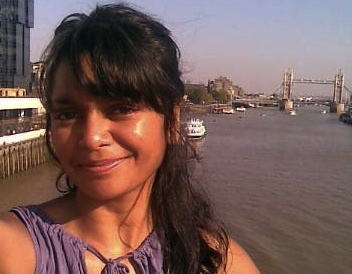A guest lecture offering students a global perspective to constitutional law and labour law has been delivered as part of an annual programme of speakers organised by Kent Law School’s Centre for Critical International Law (CeCIL).
CeCIL Co-Directors Dr Sara Kendall, Dr Emily Haslam and Dr Luis Eslava invited Dr Vidya Kumar (pictured) from Birmingham Law School to deliver a lecture based on her research which traverses the fields of philosophy of law, constitutional law, and public international law.
Dr Kumar’s CeCIL lecture on ‘Revolutionary Constitutionalism and Global Theory’, was given as part of an ongoing research project, the outcomes for which are due be published in a forthcoming book on International Law and Revolution: Theory, History and Adjudication. In the talk, open to all law students, Dr Kumar explored why traditional approaches to both “constitutionalism” (theorised as national constitutionalism) and “global constitutionalism” fail not only to offer a proper epistemic understanding of the meaning of constitutionalism, but also fail to help offer an understanding of how constitutional selves are formed and recognised at the national and global levels.
Dr Kumar said: ‘I am extremely grateful to CeCIL for inviting me to present my work in international law to such a vibrant and engaged law school. It was the perfect venue and audience to test my ideas on revolutionary and global constitutionalism; the audience were warm and welcoming, and offered fantastic feedback and comments for my draft paper. It was wonderful to be a part of such a cutting-edge series of speakers in international law which I think is the best in the UK.’
Whilst visiting the School, Dr Kumar also delivered a second lecture to Kent LLM students studying the International Human Rights module convened by Dr Eslava. Dr Kumar said: ‘The LLM students at Kent were interested, engaged and motivated to discuss the problems with merging international labour rights with international human rights. Dr Eslava led his seminars in a highly skilled and dynamic manner, which speaks to the high quality of legal education at Kent.’
Dr Eslava said: ‘Dr Kumar brought an extremely interesting reading of the way in which global dynamics are affecting both local and international understandings of constitutional processes, the use of human rights and the transformation of labour relations. Her scholarship is a fascinating example of how analytical rigour and an awareness of historical and jurisprudential global processes help us to envision new futures. It was wonderful to witness how she transmitted so much knowledge to the broader academic community at the School, with so much kindness and passion.’
CeCIL is an innovative research centre which aims to foster critical approaches to the field of international law, and other areas of law that touch upon global legal problems. The CeCIL annual lecture, which this year focuses on the victims of international law, is due to be delivered by Professor Gerry Simpson from the London School of Economics on Thursday 17 March at 6pm in Eliot Lecture Theatre.

